ETH

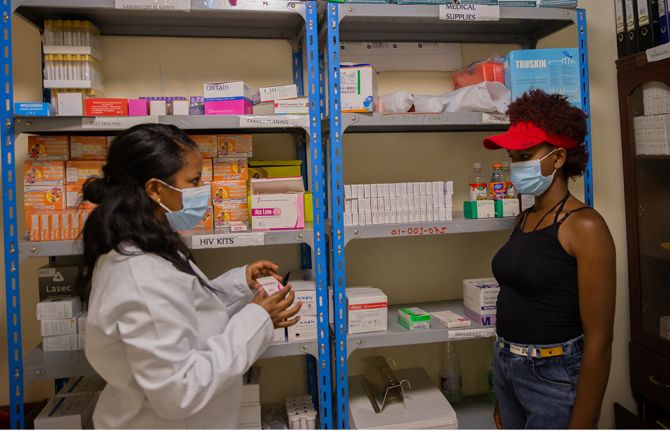
Feature Story
A crisis unfolding: hard-won progress in Ethiopia’s HIV response at risk
13 February 2025
13 February 2025 13 February 2025Ethiopia has made significant progress in its HIV response in recent years and is on track to reach the UNAIDS 95-95-95 targets with 90% of people living with HIV in the country being aware of their HIV status; 94% of those diagnosed with HIV receiving antiretroviral (ARV) therapy; and 96% of people on ARV therapy achieving viral suppression.
But now, that progress is at risk. The recent pause in United States foreign assistance poses a direct threat to the lives and well-being of thousands of people living with HIV in Ethiopia and millions globally. Critical services are grinding to a halt, leaving people who rely on them facing an uncertain and dangerous future.
Ethiopia is heavily reliant on external funding for its AIDS response. PEPFAR provides 53% of HIV funding in the country. In 2023, UNAIDS’ estimates show that there were 610 000 people living with HIV in Ethiopia, 510 000 of whom were accessing antiretroviral treatment.
For women living with HIV, uncertainty is growing. Limited and unclear communication from healthcare providers and policymakers has left them in the dark about treatment changes, medication availability, and service disruptions. With no clear answers, they are forced to rely on rumors, fueling fear and anxiety.
“We don’t know what’s happening. Are services being cut permanently? Will we still get our medication next month? No one is telling us anything,” one woman shared.
To make matters worse, case workers and counsellors—once a vital source of medical and emotional support—are disappearing. These professionals were more than healthcare providers; they were trusted confidants who ensured women received care in a stigma-free environment. Their absence is leaving many feeling abandoned.
“They understood our struggles, checked in on us, and made sure we had what we needed,” another woman explained. “Without them, we feel forgotten.”
As services become increasingly unreliable, distress and fear are taking hold.
Shortages and desperate measures
Funding cuts bring shortages, and for women living with HIV, the fear of running out of medication is overwhelming. Access to antiretroviral therapy (ART) is essential—it keeps people alive. Yet many are already facing supply disruptions, and whispers of medication shortages are spreading panic.
“If I can’t get my medicine, what happens to me?” one woman asked. Women living with HIV who have been healthy for years now fear an uncertain future where their treatment is no longer guaranteed. People living with HIV who do not access antiretroviral therapy will eventually develop AIDS and die. To cope, many have resorted to stockpiling medication, traveling long distances and spending entire days at clinics in hopes of securing extra supplies. While understandable, this survival strategy comes at a heavy cost—disrupting work, family life, and daily routines. No one should have to live in fear of their next refill. The urgent need for stable, uninterrupted HIV treatment cannot be overstated.
Adding to the crisis, shortages extend beyond medication. The dwindling supply of test kits, including viral load tests, is threatening the future of diagnosis and monitoring. These tests are crucial to ensure that people living with HIV maintain undetectable viral levels, reducing transmission risks and protecting their health.
Fears have also been expressed around the availability of medications for HIV prevention, particularly for the prevention of vertical transmission of HIV. If the current pause in the supply of medical resources continues, the availability of these vital medications could be severely compromised, putting the lives of women and children at even greater risk. For women living with HIV who are pregnant, a lack of lifesaving medications for themselves also means their children can be born with HIV even though this is entirely preventable.
Without test kits and prevention measures, undiagnosed and untreated cases could rise dangerously. “We can’t afford to go backward,” one woman said.
A Plea for Action
The voices of these women reveal a stark and urgent reality—funding cuts have left people living with HIV in a state of uncertainty, with no clear path forward.
"Urgent intervention is needed,” stressed Tina Boonto, Country Director for UNAIDS Ethiopia. “UNAIDS is gathering information and developing funding solutions to address the shortfall, with proposals for both the government and external partners to ensure continuity of critical services. We hope Ethiopia's government will step up and lead in covering these essential services. We must act now to safeguard gains that have been made and succeed in securing sustainable support to people living with HIV."
While the future remains uncertain, one thing is clear: without swift action, the hard-won progress in Ethiopia’s HIV response is at risk.
Impact of recent U.S. shifts on the global HIV response
Region/country
Related


Feature Story
Impact of the pause of U.S. foreign assistance in Ethiopia
06 February 2025
06 February 2025 06 February 2025The pause of U.S. foreign assistance on Ethiopia will affect many areas of development, however its impact on Ethiopia’s national HIV response is particularly severe.
Ethiopia is on track to reach the global 95-95-95 targets: with 90% of people in Ethiopia living with HIV being aware of their HIV status; 94% of those diagnosed with HIV receiving antiretroviral (ARV) therapy; and 96% of people on ARV therapy achieving viral suppression. ARV treatment is currently provided to 503,000 people via 1,400 health facilities across the country. However, with ongoing challenges to the country health system and socio-economic development, Ethiopia remains reliant on external donors for its HIV response.
SERVICE DISRUPTION: Pause of U.S. assistance to community programs and drop in centres serving women, young girls and priority populations at higher risk of HIV infection means tens of thousands of individuals will no longer be able to access critical services such as HIV testing, antiretroviral treatment, pre-exposure prophylaxis (PrEP) for HIV prevention, and screenings for tuberculosis, sexually transmitted infections and support to address gender-based violence. The closure of many drop -in centres and the termination of outreach workers’ and peer educators’ contracts will effectively shut off support to vulnerable groups.
Table: Breakdown of Service Disruption in three regions in Ethiopia: Addis Ababa; Oromia and Gambella
| Number of people | Type of service |
| 2,385 | People will not be able to continue to access ARV treatment; TB treatment; STI treatment |
| 18,075 | People will no longer receive support for health and care services (differentiated service that facilitates easier access to health care providers) |
| 14,811 | People will not be encouraged and supported to access HIV testing (key to the success of HIV programmes is people knowing their status and starting treatment early) |
| 879 | People will stop accessing pre-exposure prophylaxis to prevention new HIV infections (PrEP) |
| 100 | People will stop the pilot programme for the new simplified, twice annual injectable PrEP |
| 235,560 | People will no longer receive condoms to prevent new HIV infections and sexually transmitted infections. |
SUPPLY CHAIN DISRUPTIONS: The funding freeze has caused critical delays in the supply of essential HIV services, including testing kits and other resources. Notably, PEPFAR is responsible for 100% of the procurement of viral load and Early Infant Diagnosis (EID) reagents. The interruption in funding is limiting the availability of these crucial supplies, undermining the program’s ability to conduct timely viral load and EID testing, which are essential for effective patient monitoring and treatment.
REDUCED CAPACITY FOR HEALTHCARE SUPPORT: The pause threatens to stall efforts to build local healthcare capacity. It impacts the training and support of health workers, slowing progress in Ethiopia’s fight against HIV. This reduction in capacity limits the ability of healthcare professionals to respond effectively to the growing HIV epidemic. The disruption of ICAP’s capacity building, M&E, and clinical mentoring threatens care for advanced HIV patients, putting Ethiopia’s progress at risk. The freeze is also likely to scale back key prevention programs, including outreach, education, and services for key populations, worsening the epidemic
HEALTH INFORMATION SYSTEM DISRUPTION: Ethiopia's Health Information System is severely affected by the stop work order. The termination of 10,000 data clerks, who are essential for entering ART data into the health information management system, is compromising data management, particularly in tracking lost-to-follow-up cases. This disrupts key national activities, such as HIV estimations and studies of key populations. Furthermore, the cessation of the HIV surveys and surveillances, and HIV Estimation Technical Working Group (TWG) which includes CDC, USAID, and PEPFAR undermines the accuracy of HIV data and threatens the continuity of critical HIV data management systems.
HUMAN RESOURCES IMPACT: Ministry of Health shared that 5,000 public health workers’ contracts funded by U.S. assistance from all regions in Ethiopia have been terminated. These health workers are supporting Ethiopia’s HIV response – improving regional capacity to accelerate progress towards Ending AIDS. While the government of Ethiopia will take over the gap, the sudden loss of programmatic experience and the transition period will be rough.
ACTIONS TO ADDRESS THE SITUATION: On 4 February 2025, The Ministry of Health of Ethiopia issued a circular to all regional health bureau to assure regional health offices that the government will step in to manage the work that was performed by the US-funded personnel in order to ensure programme continuity.
UNAIDS Ethiopia together with WHO will be convening a situation assessment briefing on 11 February 2025 with government, CSOs and development partners to identify solutions to address gaps in the HIV, TB, Malaria and health andcCommunity systems responses in Ethiopia.
Region/country
Related

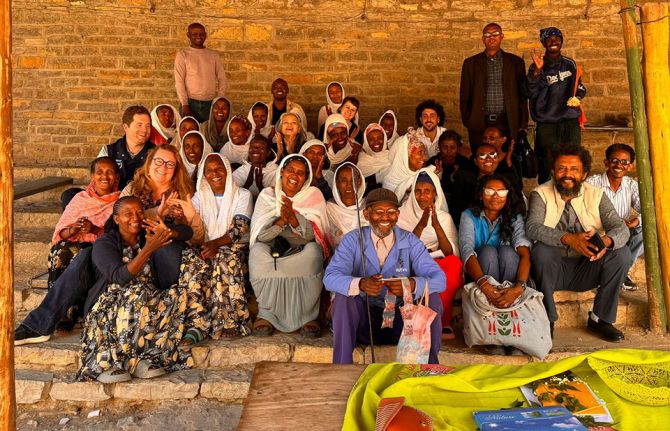
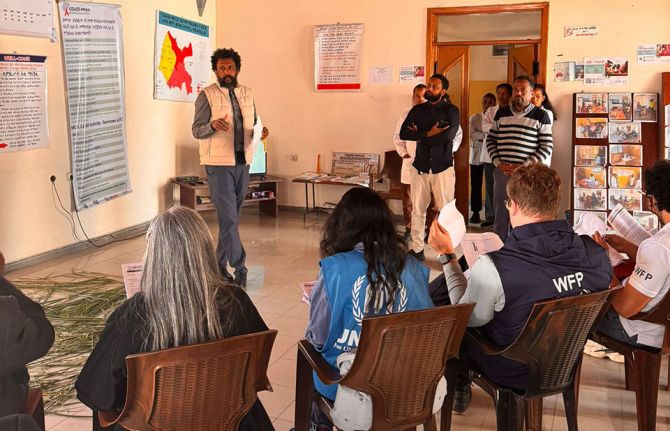
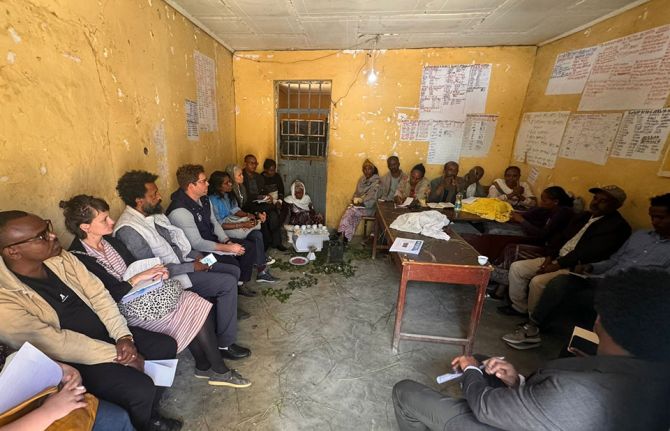
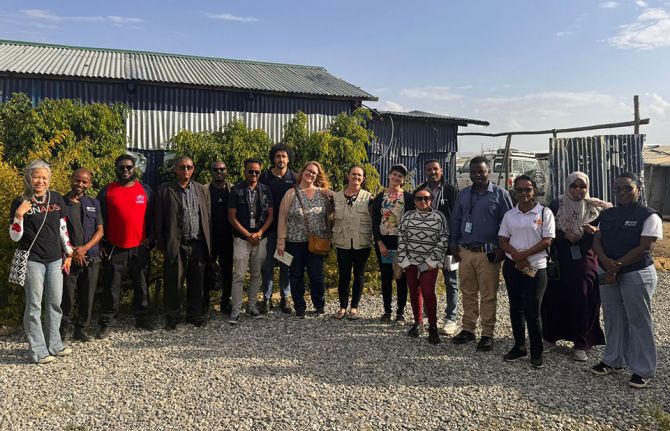
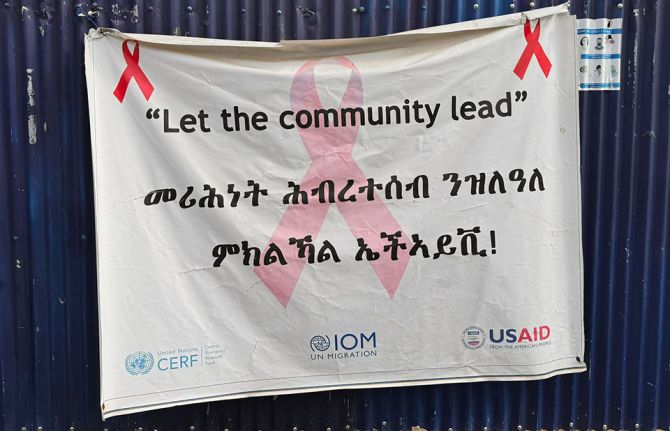
Feature Story
Resilience amid crisis: strengthening the HIV response for displaced communities in Ethiopia
02 December 2024
02 December 2024 02 December 2024Ethiopia faces a triple crisis of conflict, climate change, and displacement that impedes the capacity to provide essential health and other humanitarian assistance to those in need, including people living with HIV.
With support from 2Gether 4 SRHR, UNAIDS and partners recently organised a joint mission to learn about the humanitarian response and to identify the challenges that persist. The findings of the mission will help update the guidelines on Addressing HIV in Humanitarian Settings, a crucial resource for all actors working on HIV in emergency settings, providing evidence-based recommendations for integrating HIV into the different sectors of humanitarian responses.
Ethiopia hosts more than 1 million refugees, predominantly from South Sudan, Somalia, Eritrea and Sudan, the majority of whom live in 24 refugee camps established across five regional states, and 80,000 of whom reside in the capital Addis Ababa. In addition, the country has 4.4 million internally displaced persons (IDPs) and over 1.5 million IDP returnees.
The team visited two of the regions hardest hit by humanitarian crises, grappling with rising HIV rates: Tigray and Gambella. In Tigray, just 5 kilometers from the capital Mekelle, lies Seba Kare (70 Kare) IDP camp—a settlement hosting over 20,000 people displaced by the conflicts in the western and eastern parts of the region. Seba Kare represents both the resilience of its inhabitants and the dire challenges of prolonged displacement. The camp, initially intended as temporary shelter for six months, has now housed many families for over four years. Cramped conditions, insufficient food, limited access to education, and inadequate healthcare services are daily realities for residents. Despite the tireless efforts of humanitarian partners on the ground, the growing needs of the displaced population far exceed the resources available.
Among the most pressing gaps is the lack of comprehensive healthcare, particularly for people living with HIV. In humanitarian crises, critical services for HIV and sexual and reproductive health are often sidelined, overshadowed by the urgent need for food, shelter, and disease control. Healthcare is restricted to primary services. Care for chronic conditions, such as HIV, is referred to government hospitals. This means that all patients, IDP or not, must pay for transportation as well as services and purchase vital medical supplies on their own—an impossible burden for many.
Despite the continuous advocacy efforts in support of the decentralization of services and outreach interventions at camp-level, government-owned facilities outside the camp remain the only viable option for IDPs in need of health services.
The refugee camp of Jewi—in the western province of Gambella which has the highest HIV burden across Ethiopia—is equipped with its own antiretroviral therapy center. However, like in Tigray, Gambella faces significant challenges in providing HIV testing and treatment. Limited mobility within and beyond the camps, due to the costs of transport for clients and a shortage of ambulances in medical emergencies, combined with resource constraints at health centres, often results in treatment interruptions and high rates of loss to follow-up.
Adding to the crisis, the recent reduction in donor funding has severely impacted the quality of health services in the camps. The gender-based violence (GBV) center run by International Medical Corps will soon close due to funding cuts, leaving no other GBV services available outside of health services.
The situation for women and youth in Gambella is especially concerning. Limited educational and employment opportunities, compounded by rising HIV infections, put them at higher risk of infection due to the adoption of negative coping mechanisms, including substance abuse. The high rates of new HIV infections exacerbate these existing challenges, underscoring the urgent need for sustained interventions to improve health services, livelihoods, and social inclusion for refugees and host communities in the region. “There are many young and vulnerable people who need protection, shelter, food, income, education – and HIV prevention, testing, treatment and care. We must make sure to rebuild health and social services and fill the current resources gap,” said Tina Boonto, UNAIDS Ethiopia Country Director.
As international organisations step up their efforts to address HIV in humanitarian settings, there is a coordinated push in Ethiopia, at both the federal and regional levels, to ensure that the health needs of people living with HIV are met, even in the most challenging circumstances. The Ministry of Health, with support from UNAIDS, is developing an HIV Baseline Survey in Humanitarian Settings and a comprehensive National HIV/Sexual and Reproductive Health Guiding Document. This initiative is a substantial step towards safeguarding the rights and well-being of people living with HIV across the country.
"Ethiopia's progress in addressing HIV is inspiring,” said Maheswari P Murugayia, Public Health Officer and Global HIV Focal Point at UNHCR. “Tackling HIV in humanitarian settings is not just a priority— it’s a necessity for ensuring the health and well-being of displaced populations.”
Region/country
Related
 Zambia - an HIV response at a crossroads
Zambia - an HIV response at a crossroads

24 February 2025
 Status of HIV Programmes in Botswana
Status of HIV Programmes in Botswana

20 February 2025


Press Statement
UNAIDS welcomes signing of an agreement to restore peace in northern Ethiopia
03 November 2022 03 November 2022The peace agreement will facilitate access to health services including access to HIV services amidst reports of stock-outs of antiretroviral treatment and people going without access to the life-saving medicines
GENEVA, 3 November 2022—UNAIDS welcomes the peace agreement to permanently ‘silence the guns’ and end the conflict in northern Ethiopia. The agreement, facilitated by the African Union as part of its principled position of ‘African solutions to African problems’, was signed by the Government of the Federal Democratic Republic of Ethiopia and the Tigray Peoples' Liberation Front on 2 November 2022.
“This is a critical first move that will bring relief and bring hope for the Ethiopian people, particularly the most vulnerable populations including women and children,” said Winnie Byanyima, Executive Director of UNAIDS. “This first step will lay the foundations for sustainable peace in the country and facilitate access to life-saving health services, including HIV services, for people affected by the conflict.”
UNAIDS welcomes the Government of Ethiopia’s commitment to “enhance its collaboration with humanitarian agencies to continue expediting aid to all those in need of assistance, to assist all civilians in need, leaving no one behind, and to continue the efforts to restore public services and rebuild the infrastructures of all communities affected by the conflict”.
In 2021 more than 480 000 people living with HIV were on treatment in Ethiopia. Ethiopia was on the right path for a successful response to HIV and was making positive gains towards ending AIDS by 2030, despite some areas still falling behind. However, the conflict has caused major concerns for maintaining and sustaining HIV prevention and treatment efforts in the areas affected by the conflict, putting continued progress on HIV in jeopardy.
Comprehensive access to health care is critical, including HIV prevention, testing, treatment, and care services. UNAIDS appeals to the Government of the Federal Democratic Republic of Ethiopia, and to international partners supporting the peace process, to include HIV services when implementing the peace plan, especially in “rebuilding infrastructures in affected communities and the economic recovery of the country”.
UNAIDS
The Joint United Nations Programme on HIV/AIDS (UNAIDS) leads and inspires the world to achieve its shared vision of zero new HIV infections, zero discrimination and zero AIDS-related deaths. UNAIDS unites the efforts of 11 UN organizations—UNHCR, UNICEF, WFP, UNDP, UNFPA, UNODC, UN Women, ILO, UNESCO, WHO and the World Bank—and works closely with global and national partners towards ending the AIDS epidemic by 2030 as part of the Sustainable Development Goals. Learn more at unaids.org and connect with us on Facebook, Twitter, Instagram and YouTube.

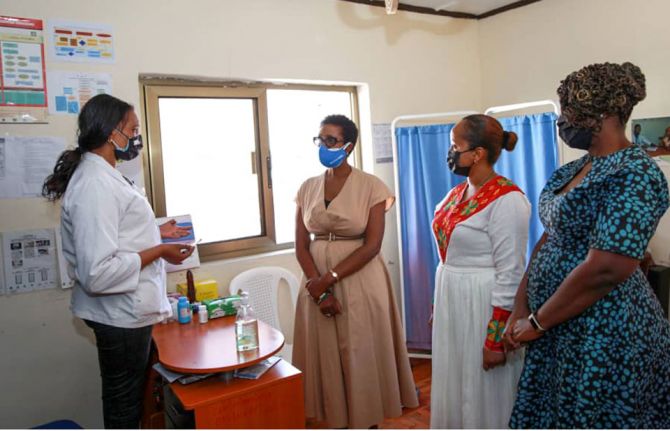
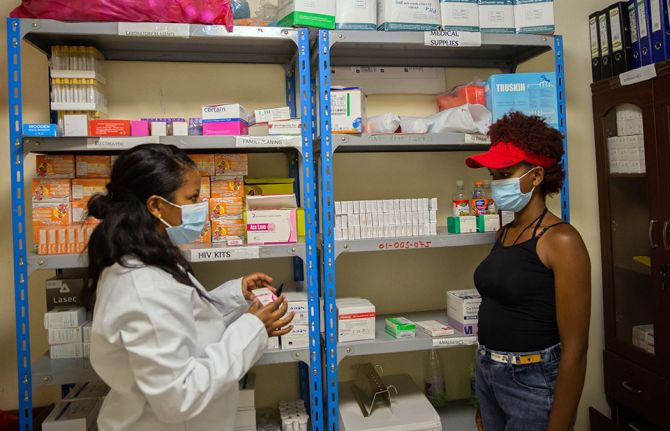
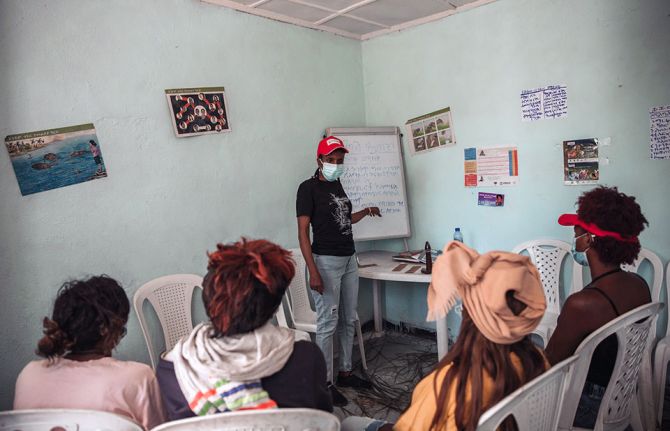
Feature Story
Drop-in centre provides a lifeline for sex workers in Ethiopia
24 March 2021
24 March 2021 24 March 2021Located in Bole sub-city, the Bole drop-in centre is one of 12 such centres established in Addis Ababa, Ethiopia, to provide community-based comprehensive HIV services. It provides critical services and support for clients, including female sex workers, and has been a lifeline during the COVID-19 outbreak.
The centre offers a full range of integrated clinical services, including HIV testing and self-testing kits, the provision of oral pre-exposure prophylaxis (PrEP), antiretroviral therapy, the diagnosis and treatment of sexually transmitted infections, screening and referral for the treatment of tuberculosis, cervical cancer screening and treatment, and programmes to prevent and respond to gender-based violence, including access to post-exposure prophylaxis.
The drop-in centre is strategically located in one of the city’s hotspots to cater primarily for female sex workers and their children, young women and adolescent girls who are out of school, and men at higher risk of HIV infection.
It also offers consultations by mobile phone, with 31 cyber-educators trained to provide 15-minute counselling sessions with an accent on the prevention of both HIV and COVID-19. The programme has proved to be invaluable during the COVID-19 pandemic.
“I am truly inspired by the work being carried out at the Bole drop-in centre,” said UNAIDS Executive Director, Winnie Byanyima, when she met staff and clients during her recent visit to Ethiopia. “It is a great example of integrated community-led service delivery and is exactly the kind of programme that is key to ending AIDS as a public health threat by 2030.”
The centre is primarily funded by the United States President’s Emergency Plan for AIDS Relief, through the United States Agency for International Development, while UNAIDS has provided catalytic funding for the cyber-education programme, the promotion of PrEP among vulnerable groups of people and mental health counselling. This support will help to generate the uptake and continuation of needed services during the COVID-19 pandemic. Partners include Population Services International and a local nongovernmental organization called Integrated Service on Health and Development Organization.
As the measures taken to contain COVID-19 continue to bite, the Bole sub-city drop-in centre will remain a critical service for female sex workers and their families.
“During the COVID-19 lockdown, many sex workers found it difficult to work and the drop-in centre has been their only source of food,” said Sister Desta Franso, an antiretroviral provider and counsellor at the clinic.
Up to 20 female sex workers use the centre every day and around 140 women are receiving HIV medication. Treatment retention at around 94% is extremely high.
“I am so happy to be able to come here to get free medication and condoms,” says Mekdes Matiyos, a regular user of the clinic. “I can also just come to take a shower and rest whenever I need to, and I don’t have to pay.”
Our work
Region/country
Related
 Zambia - an HIV response at a crossroads
Zambia - an HIV response at a crossroads

24 February 2025
 Status of HIV Programmes in Botswana
Status of HIV Programmes in Botswana

20 February 2025

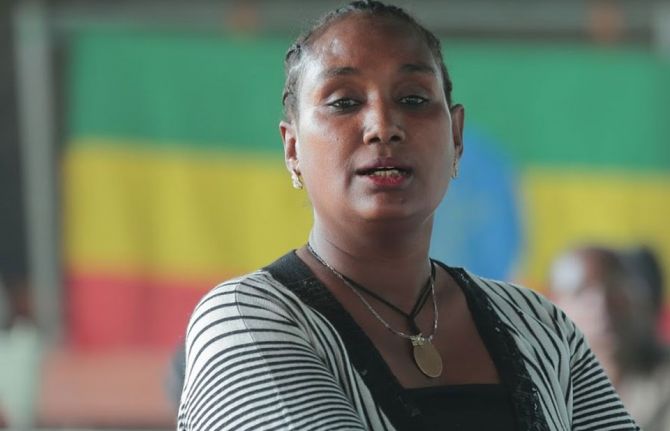
Feature Story
Talking about a revolution
24 March 2020
24 March 2020 24 March 2020It is no surprise that Birknesh Teferi’s first name means “revolution” in Amharic, the language spoken in Ethiopia. She exudes passion and self-pride; she’s the picture of health and well-being.
Her journey to this point in her life is indeed revolutionary—a story of resilience, hope and transformation. She has beaten tuberculosis (TB), survived cervical cancer and is living positively with HIV.
Ms Teferi was diagnosed with HIV and TB in 2003, a time when information about HIV, TB and sexual and reproductive health in Ethiopia was scarce and stigma and discrimination high.
According to the World Health Organization (WHO), Ethiopia is one of the 48 high-burden TB countries globally. In 2018 in the country, 165 000 people fell ill with TB and there were 27 000 deaths; 2200 of which were among people living with HIV.
After waiting 15 days for her test results, while the health-care worker went on leave, Ms Teferi was told that she was “positive”.
“I thought it was good news. I hugged the nurse in relief, only for her to tell me that being HIV-positive meant I had the virus,” she said.
Ms Teferi successfully underwent the WHO recommended treatment for TB—directly observed treatment short-course (DOTS)—which cured the TB but did not help her with her struggle to accept her HIV status.
“What followed was a period of hurt and heartbreak … Waiting for death,” she recalled of the aftermath of her diagnosis.
She describes herself then as a “drifter.” She did not disclose her HIV status because of stigma and worked as a sex worker to make ends meet.
“If a client had a condom, we would use it. If he didn’t, we didn’t. I tried to use them, but I had no money to buy them. That’s how I developed a sexually transmitted infection.”
During the treatment of the infection, Ms Teferi was diagnosed with cervical cancer and was referred from one health facility to the next, often in different towns.
She eventually found a “caring” doctor and had an operation to treat the cancer. “I was in so much pain, I couldn’t sit. I was miserable,” she remembers.
But when Ms Teferi started to take HIV treatment in 2008, her life slowly changed. She started to look after herself more. She insisted on condom use with her clients.
She met a group of women living with HIV from the Tilla Association of HIV-Positive Women in Hawassa, Ethiopia. The association focuses on capacity-building and training and support of women living with HIV. It runs an embroidery centre as an income-generating activity for women living with HIV, where Ms Teferi now works.
“I am now free of drifting. Life is so much better. If people feel that it is possible to live, possible to work, then life can change,” she said.
For the first eight months of her time at the centre, the manager assigned her a volunteer to help her with her physical recovery from her operation. For the first time, she had support from other women who understood what it was like to be her.
The women at the centre invited her to watch a film about living positively with HIV. “That movie gave me hope,” she says. “I started to learn more about HIV from my manager. I gradually got relief, better medical services and Tilla supported me financially and emotionally.”
While Ms Teferi is on HIV treatment and has been cured of TB, there are millions of people worldwide who still lack access to prevention and treatment for both conditions. TB is the leading cause of death among people living with HIV globally.
In 2018, there were an estimated 1.2 million TB deaths, 251 000 of which were among people living with HIV—this is a 60% reduction from 620 000 in 2000. Between 2000 and 2018, TB treatment alone averted an estimated 48 million deaths among HIV-negative people and TB treatment supported by antiretroviral therapy averted an additional 10 million deaths. However, progress is slow and needs to be accelerated in order to end TB by 2030 as part of the Sustainable Development Goals.
“TB is curable and preventable,” said Aeneas Chuma, the Director for the UNAIDS Regional Support Team for Eastern and Southern Africa, a.i. “It is critical in this moment of history, in the context of the global COVID-19 pandemic, that we ensure that people living with HIV who are diagnosed with TB have uninterrupted access to HIV and TB treatment. UNAIDS is working with governments and community partners to ensure that we adapt to a rapidly changing health context, with kindness, compassion and humanity.”
Resources
Region/country
Related
 U=U can help end HIV stigma and discrimination. Here’s how
U=U can help end HIV stigma and discrimination. Here’s how

27 February 2025
 Zambia - an HIV response at a crossroads
Zambia - an HIV response at a crossroads

24 February 2025

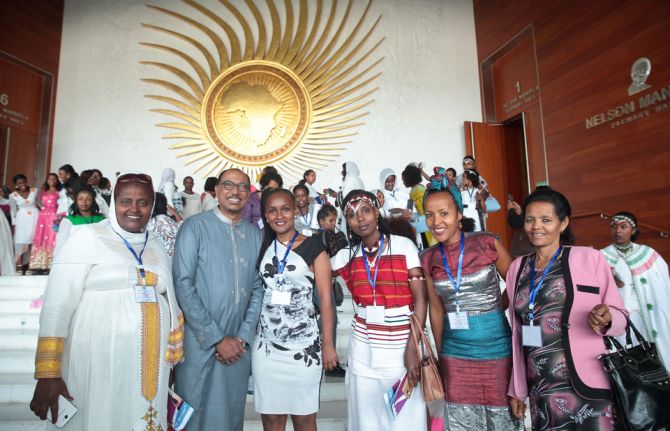
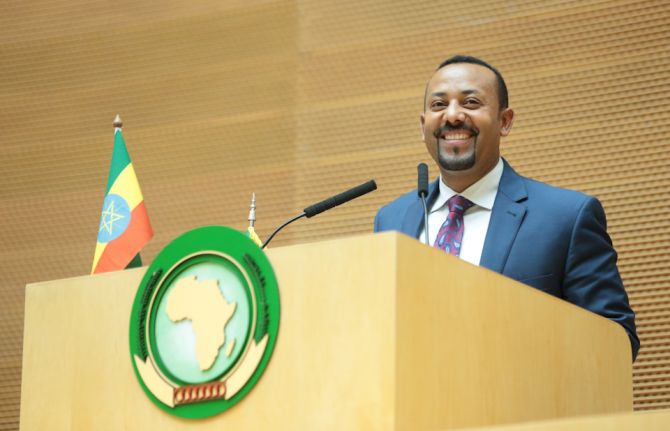
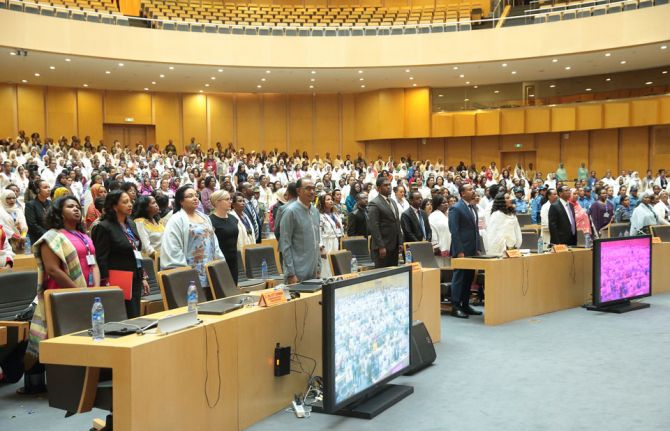
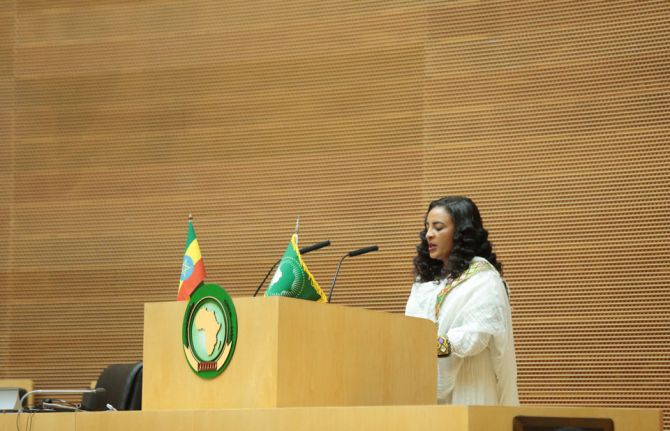
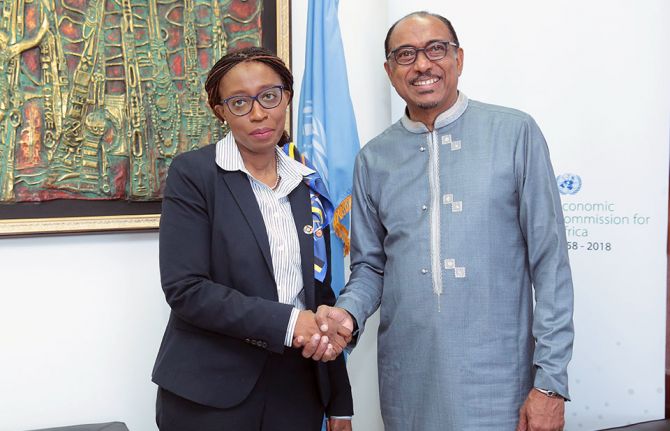
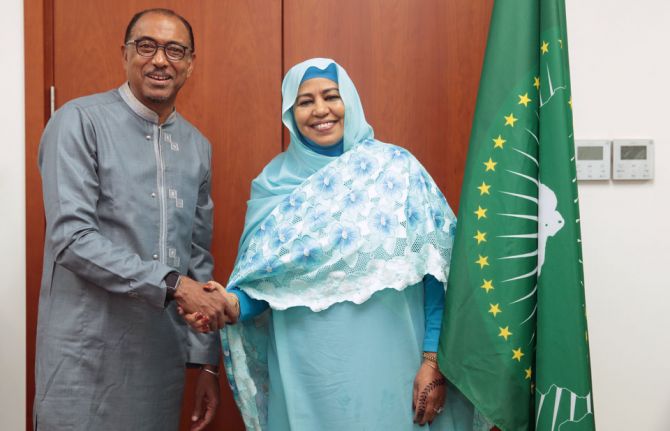
Feature Story
International Women’s Day in Ethiopia
12 March 2019
12 March 2019 12 March 2019The UNAIDS Executive Director, Michel Sidibé, celebrated International Women’s Day in Addis Ababa, Ethiopia, at an event organized by the Ministry for Women, Youth and Children Affairs and supported by UNAIDS. The event brought together female leaders and representatives of women’s associations from all over the country. Addressing the meeting, the Prime Minister of Ethiopia, Abiy Ahmed, emphasized that women are the “pillars of the nation.”
Yalem Tsegaye, the Minister of Women, Children and Youth Affairs, outlined the Jegnit initiative. Jegnit means “heroine” and is an innovative movement led by the Government of Ethiopia to empower and bring more women to leadership positions, both at the community and political levels.
During the event Mr Sidibé congratulated the Prime Minister and the Government of Ethiopia for its bold reforms in addressing the gender gap by appointing women to leadership positions in all sectors. He commended the Prime Minister for ensuring gender parity in his Cabinet.
“It is time to empower women and girls, because ending AIDS is as much about righting power imbalances as it is about health. This means prioritizing girls and young women in true partnership with them. It means providing adolescents girls and young women with more options and real choices,” said Mr Sidibé.
While in Addis Ababa, Mr Sidibé met with Vera Songwe, Executive Secretary of the United Nations Economic Commission for Africa, the first woman to hold the post in 60 years, to discuss ongoing collaboration on sustainable AIDS responses across the African continent.
Mr Sidibé also met with Amira Elfadil of the Department of Social Affairs of the African Union. In 2019, UNAIDS and the African Union are celebrating 20 years of a partnership focused on ending the AIDS epidemic across Africa.
Region/country
Related
 Zambia - an HIV response at a crossroads
Zambia - an HIV response at a crossroads

24 February 2025
 Status of HIV Programmes in Botswana
Status of HIV Programmes in Botswana

20 February 2025

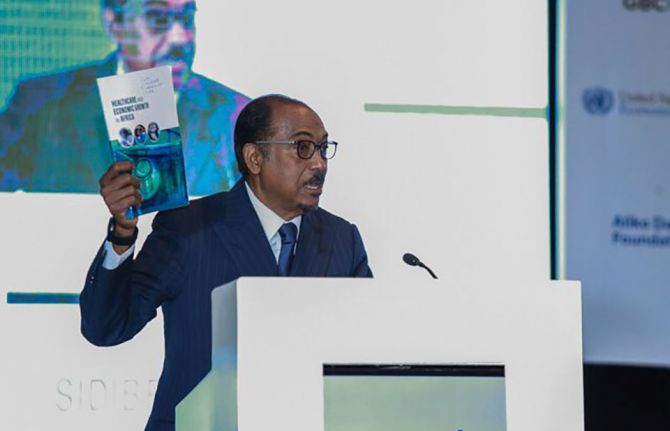
Feature Story
Healthy populations for healthy economies in Africa
15 February 2019
15 February 2019 15 February 2019Healthy populations are critical for Africa’s long-term economic growth, increasing economic gains through raised productivity, job creation and the promotion of equality. However, Africa’s health-care systems require significant investments to meet the needs of their populations and to address changing patterns of ill health across the continent.
The provision of health care in Africa, however, is constrained by a lack of public funds and limited and unpredictable donor funding. As part of innovative efforts to find a sustainable way to strengthen national health systems across the continent, African public and private sector leaders came together at the Africa Business Health Forum on 12 February to promote dialogue and identify opportunities for collaboration.
“Prioritizing health is a political choice and spending on health must be considered as an investment and not a cost. Investments in health are investments in human capital,” said Michel Sidibé, Executive Director of UNAIDS. The Prime Minister of Ethiopia, Abiy Ahmed, added, “We need affordable and quality health care for all, spearheaded by governments and the private sector working collaboratively to enable equitable access.”
During the event, which was held in Addis Ababa, Ethiopia, on the sidelines of the 32nd Ordinary Session of the Assembly of the African Union, the Healthcare and Economic Growth in Africa report was launched. The report will help to guide investments and shape narratives around health in Africa. It highlights opportunities where governments and the private sector can work together to improve health outcomes and ensure quality health care that is accessible for all.
“By 2030, an estimated 14% of all business opportunities in the health and well-being sector globally will be in Africa, second only to North America. This is a huge opportunity for the private sector,” said Vera Songwe, Executive Secretary, United Nations Economic Commission for Africa.
Also at the event, the African Business Coalition for Health—a platform designed to mobilize a core group of private sector champions to unlock synergies and advance health outcomes to build healthy economies throughout Africa—was launched.
“It is clear that African governments alone cannot solve the continent's health challenges. We have no alternative but to turn to the private sector to complement government funding,” said Aigboje Aig-Imoukhuede, Chairman of the Africa Initiative for Governance and Co-Chair, GBC Health.
Region/country
Related
 Zambia - an HIV response at a crossroads
Zambia - an HIV response at a crossroads

24 February 2025
 Status of HIV Programmes in Botswana
Status of HIV Programmes in Botswana

20 February 2025

Feature Story
Ethiopia demonstrates that communities deliver
15 February 2019
15 February 2019 15 February 2019The Community, Health Education and Knowledge Building (CHECK) project in Ethiopia is a joint collaborative project between the Italian Agency for Cooperation and Development (IACS) and UNAIDS. The project aims to support awareness-raising on HIV prevention and increase demand for the uptake of HIV and other health services, including for noncommunicable diseases.
The project is run through four implementing partners in Hawassa, which lies in the Southern Nations, Nationalities and Peoples’ Region of Ethiopia. It focuses on women, young people and people living with HIV, including elderly people, female sex workers, prison inmates and the employees of private sector megaprojects.
On 7 February, Michel Sidibé, the Executive Director of UNAIDS, Tibero Chiari, the Director of IACS, and Seharla Abdulahi, the Ethiopian State Minister of Health, visited three CHECK project implementation sites in order to assess progress and meet people benefiting from the projects.
“HIV is a disruption of the social fabric that binds us together. But in Ethiopia, the community linkages hold the social antibodies to counteract HIV. When the community has the correct knowledge it can break the chain of HIV and create stronger linkages between people,” said Mr Chiari.
The Tilla Association of Positive Women runs an embroidery centre that supports women living with HIV in Hawassa through income-generating activities. At the centre, women living with HIV produce a range of knitted and embroidered items, such as school jerseys and uniforms for the security industry. Not only does the centre provide financial support for the women, it also provides a safe space and emotional support for the women who work there.
“Tilla is like your mother’s house,” said Aster Kebede, a woman living with HIV who works at the centre. “It is my home, my school, my work … my everything.”
The Medhin Elderly People Living with HIV Association is a short walk down the road from Tilla and has had the same impact on its members. Many of its members spoke of the impact that stigma and discrimination has had on their lives, especially as elderly people living with HIV, and the loss of husbands, wives, homes and incomes because of stigma. The association has also provided small grants to many of its members, who have used the catalytic funding to generate income, build small businesses and change their lives for the better.
“Medhin has restored my self-confidence,” said Bizunesh Kensa, a 64-year-old woman living with HIV. “I don’t feel I am vulnerable anymore; nor do I worry.”
The Hawassa Industrial Park is a megaproject employing 28 000 people, 92% of which are young women and many of whom are from the rural areas of the region. Through the CHECK project, the Regional Health Bureau in Hawassa has produced and disseminated materials on HIV prevention and sexual and reproductive health for workers at the megaproject.
“These projects demonstrate that what matters most is the lives of people. They show the power of community-based projects to restore the dignity of people living with HIV and give them hope for the future,” said Mr Sidibé.
Region/country
Related
 U=U can help end HIV stigma and discrimination. Here’s how
U=U can help end HIV stigma and discrimination. Here’s how

27 February 2025
 Zambia - an HIV response at a crossroads
Zambia - an HIV response at a crossroads

24 February 2025

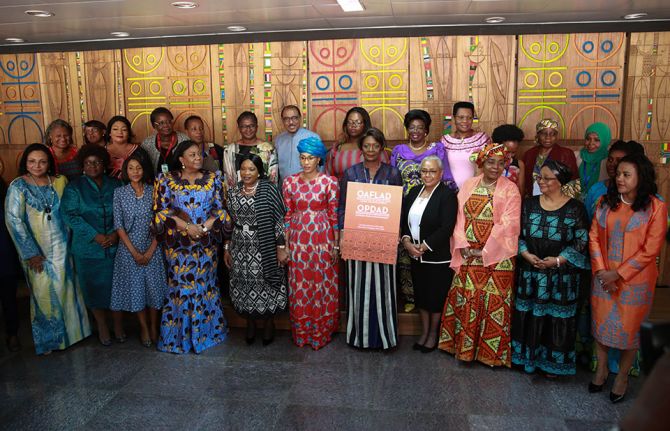
Feature Story
OAFLA to broaden its scope of work
14 February 2019
14 February 2019 14 February 2019The Organisation of African First Ladies against HIV/AIDS (OAFLA) has announced that it is to expand its scope of work to incorporate a broader range of development issues affecting the continent. OAFLA has also changed its name, to the Organization of African First Ladies for Development (OAFLAD), and adopted a vision of “A developed Africa with healthy and empowered children, youth and women”.
During its General Assembly, held in Addis Ababa, Ethiopia, on 11 February, the newly established OAFLAD endorsed its 2019–2023 strategic plan, which outlines the key thematic areas that the first ladies will be working on. These include a continued focus on reduction of new HIV infections and AIDS-related mortality, noncommunicable diseases, gender equality, women’s and youth empowerment, reproductive, maternal, newborn and child health, social security and social protection.
In a tribute to Michel Sidibé, the Executive Director of UNAIDS, the First Lady of Burkina Faso and Chair of OAFLAD, Sika Kaboré, said, “What we will remember from Michel Sidibé’s career is that we can reach ambitious targets if we believe in them, if we unite our forces strategically and if we keep our faith in our populations and in the African values of solidarity and sharing.” A number of first ladies added words of support and appreciation for Mr Sidibé’s leadership and engagement over many years, and he was awarded a certificate of appreciation.
“UNAIDS has worked hand in hand with the Organisation of African First Ladies against HIV/AIDS since that very first meeting in 2002. I had the privileged to be there then and I have the privilege to be with you still today. I urge you all to remain committed to ending AIDS, because together we can ensure a better future for our children and young people, and a generation free from AIDS,” said Mr Sidibé.
The first ladies committed to continue to work on one of their flagship campaigns, Free to Shine, a campaign to end AIDS among children, adolescents and young people and keep mothers healthy. To date, the campaign has been launched in 15 countries across Africa, many having integrated the campaign into their national HIV plans. UNAIDS is providing further funding to launch Free to Shine in Zimbabwe and Sierra Leone, with roll-out starting in 2019.
Region/country
Related
 Zambia - an HIV response at a crossroads
Zambia - an HIV response at a crossroads

24 February 2025
 Status of HIV Programmes in Botswana
Status of HIV Programmes in Botswana

20 February 2025
